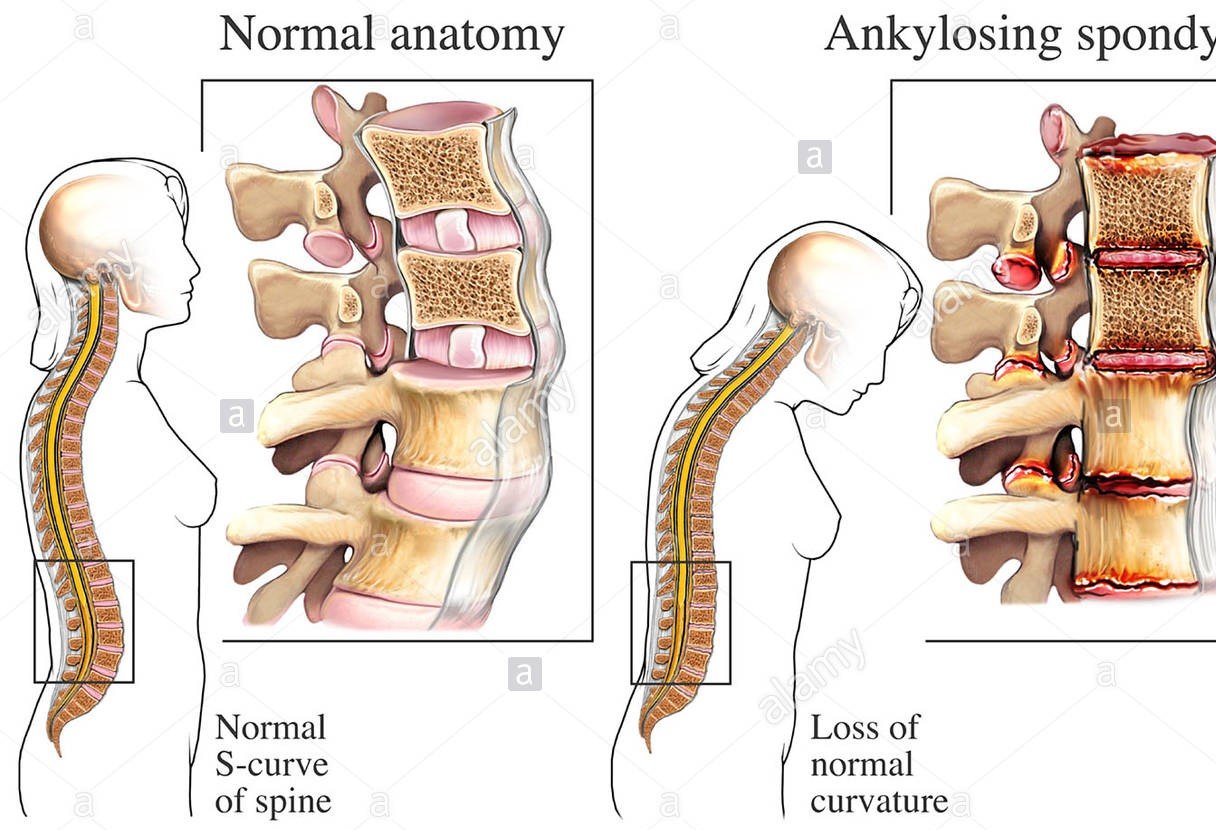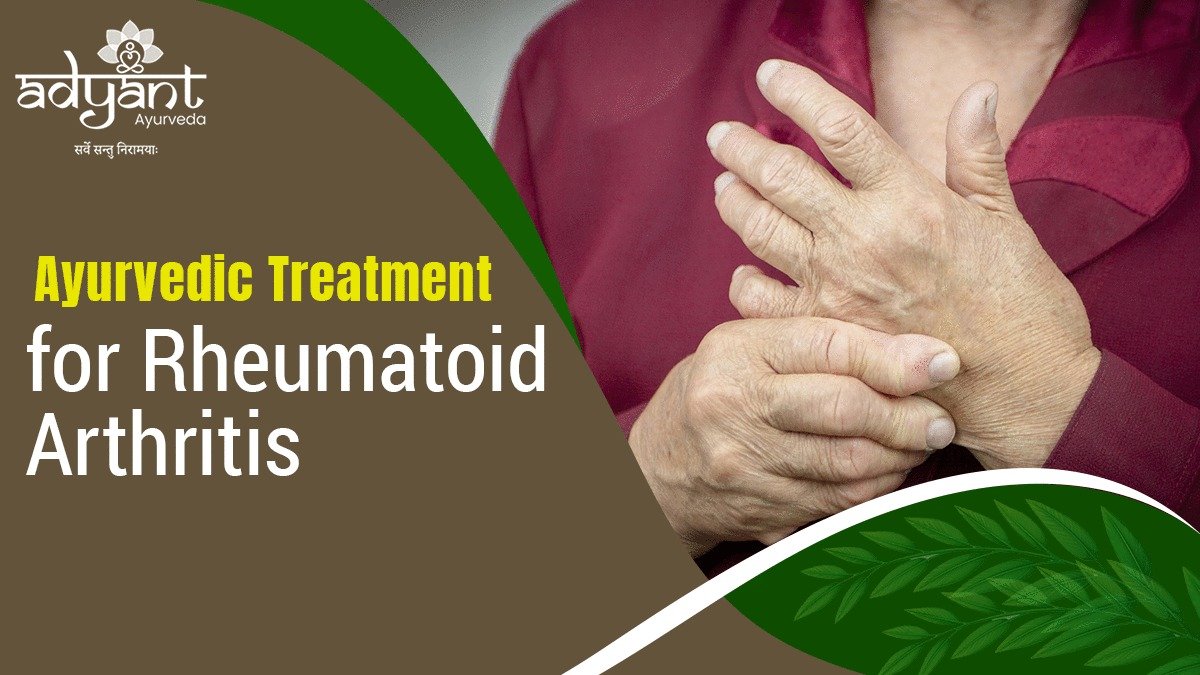
Ayurvedic Treatment for Ankylosing Spondylitis: Ankylosing Spondylitis (AS) is a chronic inflammatory condition that primarily impacts the spine and sacroiliac joints. Ayurveda views this condition as a manifestation of Vata dosha imbalance, which leads to joint degeneration, pain, and reduced mobility. By incorporating herbal treatments, Panchakarma therapies, and lifestyle changes, Ankylosing Spondylitis Ayurvedic Treatment is a holistic approach to managing AS.
For a free consultation with top ayurvedic doctors for Ankylosing Spondylitis Treatment, download our app from Play Store “AyurCare“
What is Ankylosing Spondylitis?
Ankylosing Spondylitis is an autoimmune disorder that affects the spine, causing pain, stiffness, and inflammation, particularly in the sacroiliac joints (located between the lower spine and pelvis). Over time, this inflammation may lead to the fusion of vertebrae, restricting spinal flexibility. Symptoms commonly include:
- Pain and stiffness in the lower back and hips, often worse in the morning
- Bony fusion of the vertebrae, leading to a hunched posture
- Neck stiffness and reduced ability to move the neck
- Systemic symptoms such as fever, fatigue, loss of appetite, and eye inflammation (iritis)
- Potential complications involving the heart and lungs
Ankylosing Spondylitis, a form of spondyloarthritis, exists in two types. If the condition is visible on an X-ray, it is referred to as ankylosing spondylitis or axial spondyloarthritis. However, when the condition is not visible on an X-ray but is diagnosed through symptoms, blood tests,, and other imaging methods, it is called non-radiographic axial spondyloarthritis.
What are Spondylitis and Spondylosis?
- Spondylitis refers to the inflammation of spinal joints, often associated with autoimmune diseases like AS.
- Spondylosis describes the wear-and-tear degeneration of spinal discs and joints, leading to conditions like cervical or lumbar spondylosis.
Spondylosis and spondylitis are conditions of the joints of the spine. The spine is formed from bones called vertebrae, and also the material between every vertebra within the joints is termed a disc. Over time, the joints and discs will become worn out or inflamed. First, we will try to understand Spondylitis and Spondylosis and further will address Ayurvedic treatment for Ankylosing Spondylitis
“Spondylitis is the result of an inflammatory condition of the joint that causes arthritis. Some types of Spondylitis are listed below
- Ankylosing spondylitis
- Enteropathy Arthritis
- Psoriatic Arthritis
- Reactive Arthritis
- Undifferentiated Spondyloarthritis
- Juvenile Spondyloarthritis
Spondylosis describes the vertebral joints’ general wear and tear that results in degeneration of the discs and joints. Some common types of Spondylosis are as follows
- Lumbar Spondylosis
- Cervical Spondylosis
- Thoracic spondylolysis
In this article, we are going to discuss ankylosing spondylitis and Ayurvedic treatment for ankylosing spondylitis.
Symptoms of Ankylosing Spondylitis
Pain and stiffness are the primary signs one may experience. Pain can be seen in the areas of the lower back and hip joint. Bony fusion is another sign in this condition where the vertebrae fuse together leading to a hunched back posture.
It also can have an effect on the neck, which leads to the lack of ability to move the neck. It is likewise related to different systemic signs like Iritis (Inflammation, redness in the eyes), Fever, Fatigue, and Loss of appetite.
In a few uncommon cases, it may additionally be related to coronary heart and lung diseases. In chronic cases, it leads to restriction in the ability to breathe freely.
Ayurvedic Treatment for Ankylosing Spondylitis
Various Panchakarma procedures and internal Ayurvedic drug treatments have proven beneficial in the control of AS. Asthi-majja gata vata is a term that is correlated with AS. According to Ayurveda, Ankylosing spondylitis is caused because of aggravated vata dosha. This imbalance is the reason for degeneration & inflammation of the spine and might even result in disability in a lengthy time period. In this autoimmune disorder, the disc between the vertebrae gets swollen up inflicting drawback of movement.
Ayurvedic remedy aims at digesting the ama by giving herbs and balancing aggravated vata.
External Therapy along with Lepanam, Pichu, Kati Basti, Sarvangadhara, and Patrapinda Swedana is useful for this disorder. Panchakarma Therapies such as Virechana, Nasya, Snehavasthy, Vaitharana vasthy, and Kashaya vasthi are useful to reduce pain and stop the progress of AS. Along with the Panchakarma treatment diet, lifestyle modifications are equally important to get relief from AS.
You May Like Also: Panchakarma Therapies
Diet and Lifestyle Advice for Ankylosing Spondylitis / Ayurvedic Treatment for Ankylosing Spondylitis
- Avoid Vatha and pitta pacifying food.
- Include ghee in your diet.
- Take light meals and avoid extra oily meals and curds.
- Ensuring proper evacuation of bowels, constipation ought to be avoided.
- Applying heat to affected regions will assist in alleviating pain and stiffness.
- Avoid sleeping during the daytime
- Yoga asanas which include Pawana muktasana, Bhujangasana, Dhanurasana, and Paschimottasana, are useful for this disease.
- Practice Pranayama which includes Nadi shodhana, Chandrabhedi Sheethali & Bhramari.
Best Ayurveda Therapies for Ankylosing Spondylitis / Ayurveda Treatment for Ankylosis Spondylitis
Panchakarma therapies are highly individualized in Ayurveda, and the choice of specific therapies depends on a person’s unique constitution (Prakriti), current imbalances (Vikriti), and the severity of their condition, such as Ankylosing Spondylitis (AS). An experienced Ayurvedic practitioner will assess your condition and design a personalized Panchakarma treatment plan accordingly. However, some Panchakarma therapies may be more commonly recommended for individuals with AS:
1. Basti (Medicated Enema):
Basti Therapy is one of the most commonly recommended Panchakarma therapies for AS. It involves administering medicated enemas, which can help alleviate Vata dosha imbalances. Basti therapy can reduce pain, inflammation, and stiffness in the spine and joints. There are different types of Basti, including Anuvasana (oil enema) and Niruha (decoction enema), which may be used based on individual needs.
2. Virechana (Purgation):
Virechana treatment is another Panchakarma therapy that may be considered for AS. It involves the administration of purgative substances to eliminate toxins from the body through the bowels. Virechana can help balance the doshas and reduce inflammation.
3. Abhyanga (Oil Massage) & Swedana (Steam Therapy):
Regular self-massage with warm medicated oils, such as sesame oil or Mahanarayan oil, can be beneficial for individuals with AS. Abhyanga helps improve circulation, reduce muscle tension, and alleviate joint stiffness. Swedana involves exposing the body to steam, often infused with herbal preparations. This therapy helps relax muscles, reduce pain, and improve joint mobility, making it particularly useful for AS.
4. Pinda Sweda (Herbal Compresses):
Pinda Sweda involves applying warm herbal compresses to the affected joints and muscles. These compresses are typically made with medicated herbs and can help reduce pain and inflammation.
5. Nasya (Nasal Administration):
Nasya involves the administration of herbal oils or powders through the nasal passages. It is often used to address respiratory and sinus issues associated with AS. Clearing nasal congestion can indirectly benefit AS symptoms.
6. Dietary Modifications:
While not a Panchakarma therapy, dietary modifications are an essential part of Ayurvedic treatment for AS. An Ayurvedic practitioner may recommend an anti-inflammatory diet tailored to your dosha, which includes foods that help balance Vata dosha and reduce inflammation.
How Does Ayurvedic Treatment Help to Treat Ankylosing Spondylitis?
Ayurveda offers various therapies and treatments for a wide range of health conditions, including Ankylosing Spondylitis (AS), a chronic inflammatory condition that primarily affects the spine and can lead to pain and stiffness.
1. Panchakarma Therapy: Panchakarma is a set of detoxification and cleansing procedures in Ayurveda. It aims to eliminate toxins (ama) from the body and balance the doshas (Vata, Pitta, Kapha). Panchakarma therapies like Basti (medicated enema) and Virechana (purgation) may be recommended to remove toxins and reduce inflammation.
2. Ayurvedic Medications: Ayurvedic herbs and formulations can help manage inflammation, pain, and stiffness associated with AS. Some commonly used herbs and medications include Ashwagandha, Guggulu, Shallaki (Boswellia serrata), and Triphala. These should be taken under the guidance of an Ayurvedic practitioner.
3. Dietary Modifications: Ayurveda places a strong emphasis on diet and nutrition. Individuals with AS may benefit from an anti-inflammatory diet that includes foods like ginger, turmeric, and garlic. Avoiding foods that can aggravate inflammation, such as processed foods and excessive dairy, is also important.
4. Yoga and Pranayama: Gentle yoga poses and pranayama (breathing exercises) can help improve flexibility, reduce pain, and enhance overall physical and mental well-being. A qualified yoga instructor with knowledge of AS can design a customized yoga program.
5. Abhyanga (Oil Massage): Regular self-massage with warm Ayurvedic oils, such as sesame oil, can help alleviate pain and stiffness associated with AS. Massaging the affected areas can improve blood circulation and reduce muscle tension.
6. Lifestyle Modifications: Ayurveda emphasizes a balanced lifestyle that includes adequate rest and stress management. Stress can exacerbate AS symptoms, so practices like meditation and mindfulness may be beneficial.
7. Herbal Compresses: Warm herbal compresses, known as Pinda Sweda, can be applied to affected joints to reduce pain and inflammation. These compresses are typically made with medicated herbs.
8. Snehana (Oleation): This involves applying medicated oils externally or consuming them internally to lubricate joints and reduce stiffness. It is often done before Panchakarma treatments.
Best Ayurvedic Medicines for Ankylosing Spondylitis
1. Ashwagandha: Ashwagandha is known for its anti-inflammatory properties and its ability to reduce pain and inflammation in AS. It can also help alleviate stress and improve overall well-being.
2. Guggulu: Guggulu is a resinous extract that is commonly used in Ayurveda for its anti-inflammatory and analgesic properties. It may help reduce joint pain and inflammation in AS.
3. Shallaki: Shallaki is another herb known for its anti-inflammatory properties. It can be beneficial for managing joint pain and stiffness associated with AS.
4. Turmeric: Turmeric contains curcumin, a compound with potent anti-inflammatory and antioxidant properties. Turmeric is often recommended in Ayurvedic treatment for AS to reduce inflammation and pain.
5. Triphala: Triphala is a combination of three fruits (amla, haritaki, and bibhitaki) and is used in Ayurveda to support digestion and detoxification. Proper digestion is crucial for individuals with AS, as it can help reduce the buildup of toxins that may contribute to inflammation.
6. Maharasnadi Kwath: This herbal decoction is commonly used in Ayurveda to manage inflammatory conditions, including joint pain and stiffness. It can be beneficial for individuals with AS.
7. Punarnava: Punarnava is known for its anti-inflammatory properties and can help reduce swelling and inflammation in AS.
Summary
If you’re seeking a holistic approach to managing Ankylosing Spondylitis, Ayurveda offers a variety of treatments that address the root cause of the condition, reduce inflammation, and restore mobility. Through personalized care that combines Panchakarma therapies, herbal remedies, and lifestyle modifications, you can manage symptoms effectively and improve your quality of life.
Book a Consultation with Adyant Ayurveda At Adyant Ayurveda, we specialize in personalized Ayurvedic treatments for Ankylosing Spondylitis. Our expert team of doctors will design a customized treatment plan to suit your specific needs. Experience the benefits of holistic care, rooted in over 24 years of expertise in Panchakarma and Ayurvedic therapies.
Contact us today to book your consultation and take the first step towards a pain-free, healthier life.
Phone: 9972541009.





